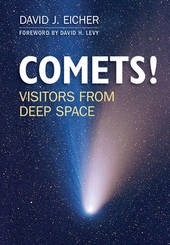
|
COMETS!: Visitors from Deep Space
Paperback / softback
Main Details
| Title |
COMETS!: Visitors from Deep Space
|
| Authors and Contributors |
By (author) David J. Eicher
|
|
Foreword by David H. Levy
|
| Physical Properties |
| Format:Paperback / softback | | Pages:230 | | Dimensions(mm): Height 253,Width 178 |
|
| Category/Genre | Astronomy, space and time
Popular astronomy and space |
|---|
| ISBN/Barcode |
9781107622777
|
| Classifications | Dewey:523.6 523.6 |
|---|
| Audience | | Tertiary Education (US: College) | | General | |
|---|
| Illustrations |
16 Plates, color; 68 Halftones, unspecified
|
|
Publishing Details |
| Publisher |
Cambridge University Press
|
| Imprint |
Cambridge University Press
|
| Publication Date |
23 September 2013 |
| Publication Country |
United Kingdom
|
Description
Join David J. Eicher in this fast-paced and entertaining journey through the history, present, and future of these important yet mysterious cosmic bodies. From ancient times, humans have been fascinated by 'broom stars' and 'blazing scimitars' lighting up the sky and moving against the fixed background of stars. The Great Comets of our time still receive in-depth attention - ISON, Hale-Bopp, Hyakutake, West, and others - while recent spacecraft encounters offer amazing insight into the earliest days of the solar system. In this guide you will discover the cutting-edge science of what comets are, how they behave, where they reside, how groups of comets are related, and much more. The author carefully explores the ideas relating comets and life on Earth - and the danger posed by impacts. He finishes with practical, how-to techniques, tips, and tricks on how to successfully observe comets and even to capture your own images of them.
Author Biography
David J. Eicher is Editor-in-Chief of Astronomy magazine, the world's largest publication on the subject. He is president of the Astronomy Foundation, the telescope industry's first-ever trade association. He is author of seventeen books on science and history, and at age fifteen founded a magazine on observing galaxies, clusters, and nebulae, Deep Sky Monthly. An avid observer of astronomical objects for more than thirty-five years, he was honored in 1990 by the International Astronomical Union with the naming of minor planet 3617 Eicher. David H. Levy is President of the National Sharing the Sky Foundation, and is one of the most successful comet discoverers in history. He has discovered twenty-two comets (eight of them using his own backyard telescopes) and was co-discoverer of Shoemaker-Levy 9, the comet that collided with Jupiter in 1994 producing the most spectacular explosions ever witnessed in the Solar System. Asteroid 3673 (Levy) was named in his honor. He has written several books, is a contributing editor and monthly columnist for Astronomy, and was the former Science Editor for Parade magazine. In 1998 he won an Emmy as part of the writing team for the Discovery Channel documentary 'Three Minutes to Impact'.
Reviews'David J. Eicher has written a wonderful, up-to-date book on the history and science of comets. The book is written in a more conversational style, with occasional humor thrown in, and is not too technical. The result is a very enjoyable read for everyone.' Gary W. Kronk, author of the 'Cometography: A Catalog of Comets' series 'Eicher's book brings the magical world of comets to life. It is not an arcane mathematical textbook but a celebration of these slowly wandering objects.' David H. Levy, author and discoverer of 22 comets 'Highly readable ... a lovely guide to comets that will remain valuable long after (Comet ISON) has departed our skies.' BBC Sky at Night Magazine 'The author is enthusiastic and knowledgeable, capable of conveying his enthusiasm intelligently. He doesn't overwhelm the reader with complex mathematics but explains the science quite clearly.' Rosie Cawkwell, Rosie Writes 'Eicher ... has a way with words. Clarity, joy, inquisitiveness, and knowledge grace every page. It is clear that he is a great comet fan and we are very fortunate that he has taken the time to share his enthusiasm with us.' The Observatory
|